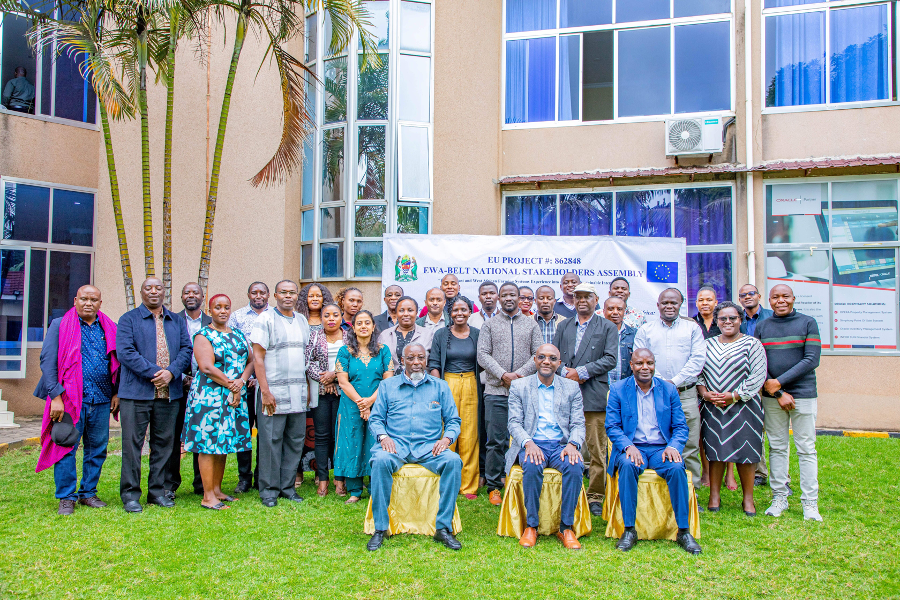EWABELT at the 23rd Infopoverty World Conference at the United Nations
- OCCAM - Observatory on Digital Communication

- Apr 24, 2024
- 4 min read
Updated: Apr 29, 2024

April 12, 2024. United Nations, New York.
On the occasion of the XXIII Infopoverty World Conference “A.I. turmoils digital processes: how to act to ensure human rights and provide e-welfare for all?” organised by OCCAM, the EWABELT Project was showcased together with its advancements and the most innovative strategies in the field of Digital Agriculture and Food Security.
On April 12th 2024, EWA-BELT presented its main achievements at the XXIII Infopoverty World Conference, an annual UN flagship Event organized by OCCAM, the Observatory on digital communication affiliated with the Economic and Social Council of the United Nations and partner of the project. This year the conference took place in presence at the United Nations Headquarters in New York city and online on Webex, live-streamed on the UNWebTV.
The topic of the Conference “A.I. turmoils digital processes: how to act to ensure human rights and provide e-welfare for all?” opened the work for a shared Plan of Action to be presented at the United Nations addressing the undergoing phenomenology and outlining future strategies to be adopted not only to achieve the SDGs and the Agenda2030, but also in view of a fairer, more inclusive and sustainable digital Society, one that involves all public and private stakeholders to cope with the opportunities and challenges of Artificial Intelligence.
With poverty levels expanding across the globe, raising concerns about a potential recurrence of the 1929 crisis – stemmed from oversaturated production and a shortage of buyers – must be addressed. It thus becomes imperative to craft comprehensive policies aimed at fostering development among the most impoverished populations. With the title “Poverty eradication and hunger: a first challenging priority for AI”, the second session of the Conference was dedicated to the EWABELT Project (GA 862848) that, executed across villages in 30 sub-Saharan regions by 20 partners among universities, research centers and businesses, showcased how the integration of AI-empowered digital technologies into agriculture and traditional knowledge and best practices fosters tangible development within Africa's most underserved communities.
The session was chaired by Melchiade Bukuru, Former Director, UNCCD, Liaison Office in New York, who highlighted how poverty and hunger have the same geography - “the poorest and the hungriest are essentially located in areas where land, the domain asset of the poor, is degraded” - and a gender connotation as well with “women bearing the brunt of desertification, land degradation and drought”. Halka Otto, Senior Liaison Officer, FAO Liaison Office in New York, not only recognized the advancements that AI and digital technologies can make to food-insecure contexts and agriculture in general, but also acclaimed the EWABELT Project for its efforts in promoting sustainable development in African regions. Giovanna Seddaiu, Professor of Agronomics and EWABELT Coordinator, University of Sassari, NRD; and a joint statement by the EWABELT Scientific Advisory Board Members, Youssef Brahimi, Founding Member of the Sahara and Sahel Observatory (OSS), and François Tapsoba; presented the social and economic implications of the Project, paying particular attention to job creation and youth involvement as well as providing five pragmatic policy recommendations and suggestions to upscale the EWABELT results, acknowledging the urgency for a human-centric, ethical, human-rights oriented and inclusive scientific approach. Then, Giovanni Zanoni, Analyst at OCCAM, with the support of University of Sassari (Prof. Quirico Migheli) and the University of Nairobi (Prof. Sheila Okoth), presented the PlantHead Platform, a digital solution that offers real-time diagnosis and eco-friendly crop protection instruments to address plant diseases and food insecurity challenges. Today, the Planthead platform stands as a crucial support tool in the EWABELT FFRUs to numerous farmers in the timely detection and treatment of crop diseases. Marco Cereda, Silicon Biotech Researcher, STMicroelectronics; Quirico Migheli, Professor, Director NRD, University of Sassari; Abigael Ouko, Researcher, University of Nairobi; showcased the Q3 qPCR portable tool developed by STMicroelectronics and tested in Kenya to test model crops that may be contaminated with mycotoxins produced fungi. Acknowledging those as significant contributors to foodborne illness, especially in Sub Saharan Africa, this digital tools will complement other innovative approaches advanced by the Project spanning from improved storage technologies and decision support systems to early detection of mold development in the stored commodities. Nicola Morganti, President, ACRA Foundation, delved into the research the Consortium is making on biopesticides. In particular, he presented the Cassia Nigricans study case in Burkina Faso, where farmers not only re-discovered the benefits of the use of the extract after many years to protect crops, but also recognized it as a valuable integrated traditional knowledge to be validated at a large scale. Finally, John Bidzakin, Research Fellow, Cranfield University, focused on the importance of research on Neglected and Underutilised Crop Species (NUS). The study case on Fonio in Ghana and its value chain attest to the enormous socio-economic implications these crops have to cope with food-security challenges and opportunities in Sub-Saharan regions.
The EWABELT Project therefore stands out as an international synergetic effort in research and innovation operative actions enriching the multilateral plethora of instances capable of advancing progress and development towards e-welfare for all, especially for undeserving regions.
On these premises, the Final Declaration and the related Plan of Action will encompass all the insights that emerged by the discussion to define a roadmap to be adopted by policymakers, international organizations, businesses and Civil Society for a fairer, more inclusive and sustainable society, guided by SDGs and UN core Principles.
In memoriam of Naresh Magan, Professor, Cranfield University
**
For media inquiries, please contact:
OCCAM - Observatory on Digital Communication





Comments